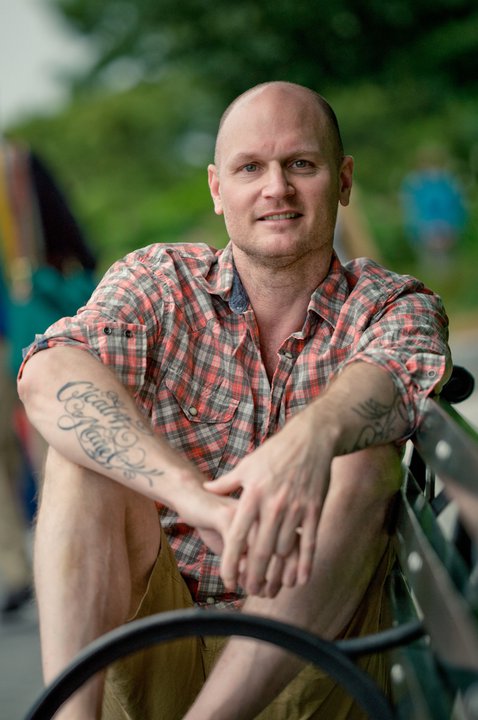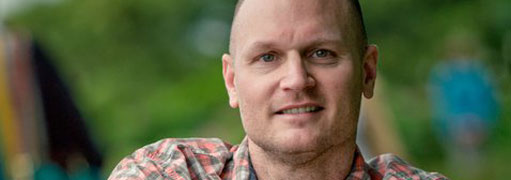“Self-help” has such an innocuous ring to it; it’s direct but also malleable and open to interpretation. It can be anything you want it to be and—according to the many promises made by this multi-billion dollar industry—so can you. After all, many skeptics have argued that same enticing (and deceptive) ring can be heard in other terms sometimes seen as synonymous with “self-help”—for instance “cop-out” or “quick fix.” The attitude of New York Times-bestselling author Augusten Burroughs falls somewhere in between. Burroughs brings his own perspective to the debate with his latest book. Originally called This Is How: Proven Aid in Overcoming Shyness, Molestation, Fatness, Spinsterhood, Grief, Disease, Lushery, Decrepitude & More. For Young and Old Alike, the book has been re-released in paperback with a less cumbersome title, This Is How: Surviving What You Think You Can’t. Burroughs tells us the biggest lesson he took away from his stint in rehab was that “affirmations are bullshit, a form of self-betrayal,” and then goes on to dispense his own brand of uniquely informed advice. At once conflicted and direct, poignant and hilarious, This Is How can be a tough nut to crack. Burroughs appears in Albuquerque at 7 p.m. on Monday, April 29, on UNM’s Main Campus at Dane Smith Hall, Room 125. The reading, presented by Bookworks and the UNM English Department’s Creative Writing Program, is free and open to the public. The Alibi caught up with Burroughs by phone at his apartment in New York.So … What exactly is This Is How? Is it for real or satire? It seems like it’s been marketed as both.It’s not satire. It’s absolutely for real. It’s not a book about how to survive this or that. Well, it is a book about that, but it’s not really about the specifics. It’s about learning to identify the real truth of your circumstances. What’s the real truth behind the thing you think is true? When you get to that, that’s how you’re able to solve whatever that issue may be. Do you differentiate between memoir and what you’ve written here? I’ve spent my whole career writing about the things I’ve gone through, whether that’s being an alcoholic (Dry), or child abuse and neglect (Running with Scissors, A Wolf at the Table). Whatever adversity I’ve experienced, that’s what I’ve written about. Over the years, people have said to me that my memoirs have been helpful. I’d just always felt like, “I wasn’t trying to be helpful, but I’m glad.” So I wanted to write something that was more nuts and bolts in terms of my thinking, where my head is when I’m facing a challenge. More than any of my books, I would say that This Is How was borne out of a labor of love. I never could have written this book if I hadn’t written so many books before, for the simple reason that I had no concept of people reading me. That’s a very abstract thing, until you go out and you meet the people who are paying money that they work for, and then spending time that they could spend with their families, instead, with your book. That created a feeling that never left me—of awe. It made me feel part of humanity in a way that I was never able to feel. It just made me feel more human. The April issue of O Magazine featured a cover photo of Oprah seated in a garden, with the word “Confidence!” screaming out from between her knees. The tagline read “How to build it, radiate it—and finally come into your own.” What are your thoughts?A lot of the messages about confidence are very misleading. Articles will say, “The trick is to be good at what you do, and to remind yourself of your past successes.” But being confident has nothing to do with being good at what you do; you can be terrible at what you do, and still be very confident. So what is confidence? You can’t go to the doctor and have your blood confidence level checked. So if you want more of it, what is it? Confidence is a thing that you don’t necessarily feel yourself. “Confidence” is the word that other people use to describe what they see in a person who is fully occupied with what they’re doing in the moment and is not at all apparently otherwise distracted by thoughts or insecurities about how they’re coming across. To get more confident, you don’t actually need to add anything to your personality. What you need to do is take something away: giving a crap about what other people are thinking. Simply focus on what you’re doing—whether you’re doing it well or not. You’ve addressed your background as an ad exec repeatedly in your books. In the YouTube promo video for This is How, you proclaim, “I can fix your brain.” Why not use your fame to become an infomercial king?I know, right? [laughs] It seems like I could be dangerously close to heading in that direction. I sort of am becoming an infomercial king, but on a much smaller scale. Instead of going on the airwaves, I’m going city by city. I stand up on a stage and tell people, “This is how. This is how I fix this. If your brain is broken in this particular way, here’s a workaround.” [laughs] So I wanted to talk about these important things that I could address, that I felt could be addressed in my way, that worked for me—and hopefully, they would work for other people.
Augusten Burroughs readingMonday, April 29, 7 p.m. University of New Mexico, Dane Smith Hall, Room 125Free admissionbkwrks.com, 344-8139






